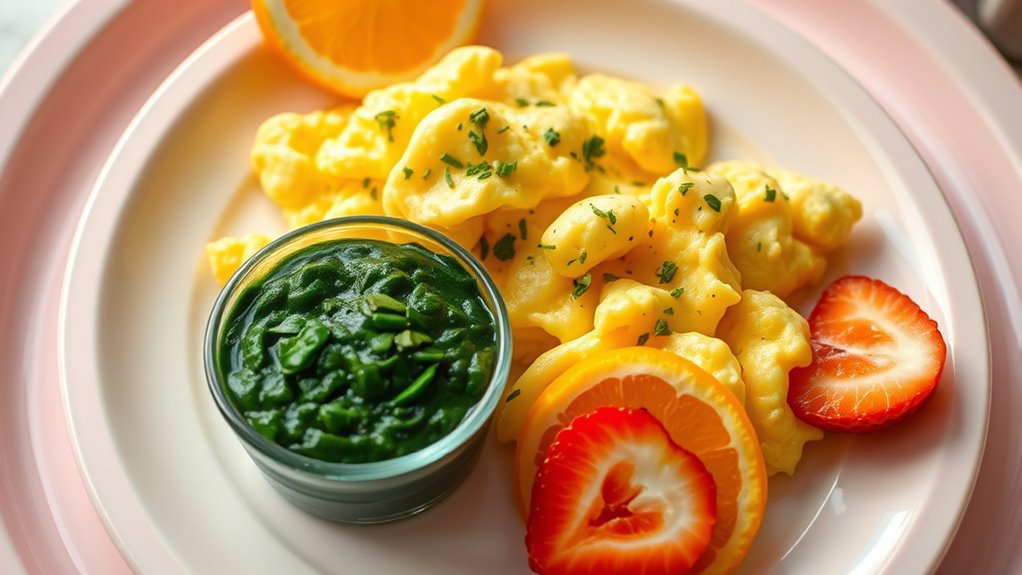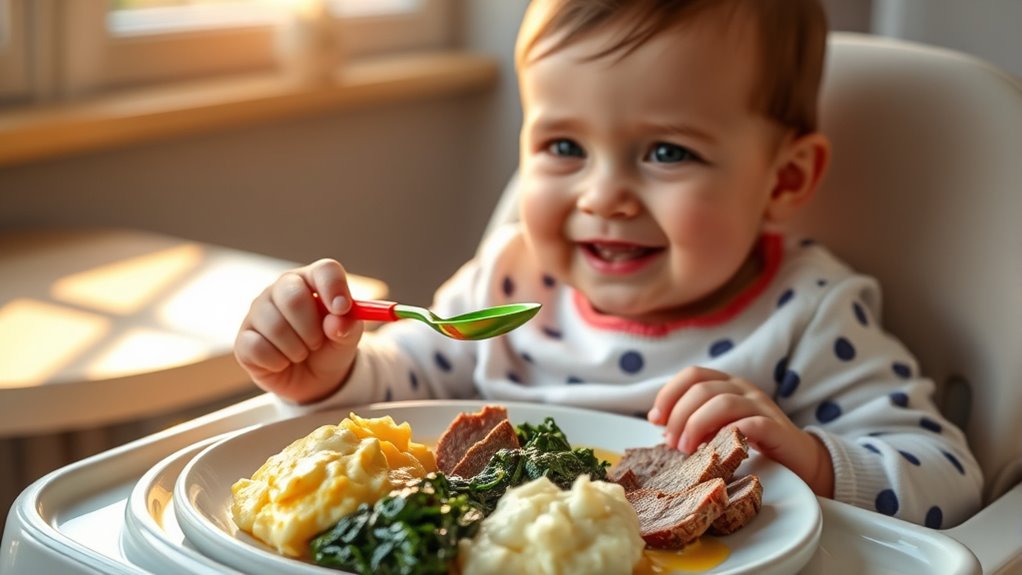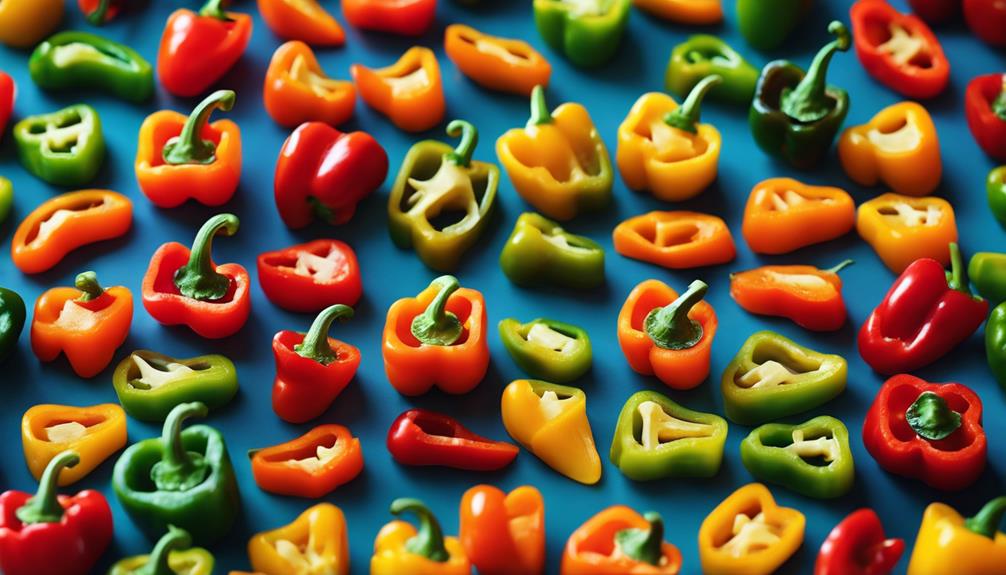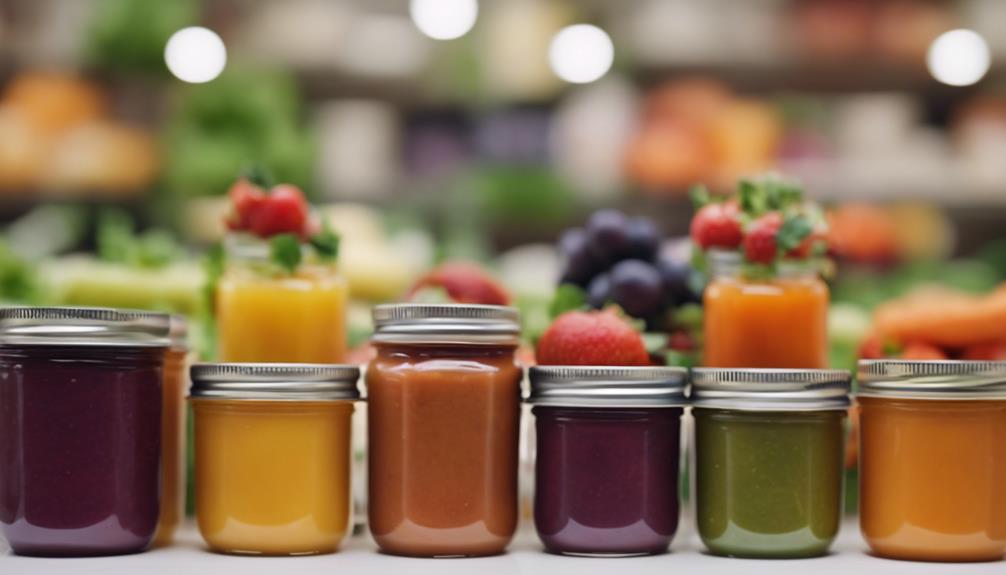Start your baby’s day with iron-rich foods to support healthy growth and development. Offer options like fortified cereals mixed with fruit purees, pureed meats such as beef or turkey, and vegetables suited for early solids. Pair these with vitamin C-rich fruits like berries or citrus to boost iron absorption. Preparing and combining these foods in creative ways can make mornings easier and more appealing. Keep exploring for more ideas to keep your little one nourished and energized.
Key Takeaways
- Include iron-rich foods like fortified cereals, pureed meats, and vegetables in your baby’s breakfast to support healthy growth.
- Pair iron sources with vitamin C-rich fruits such as berries or citrus to enhance iron absorption.
- Prepare and serve smooth, age-appropriate textures of iron-rich foods to encourage acceptance and developmental progress.
- Plan breakfast routines that consistently incorporate a variety of iron-boosting options for balanced nutrition.
- Prepping iron-fortified cereals and pureed meats in advance saves time and ensures nutritious starts to busy mornings.

Ensuring your baby gets enough iron is essential for healthy growth and development, especially since iron deficiency can lead to fatigue and developmental delays. Starting the day with an iron-boosting breakfast helps set the tone for good nutrition and supports your little one’s ongoing growth. To do this effectively, you should focus on incorporating iron-rich foods into your baby’s morning meal and plan your meal preparation accordingly. Iron-rich foods include a variety of options like pureed meats, fortified cereals, and certain vegetables, all of which can be easily integrated into breakfast routines.
Starting your baby’s day with iron-rich foods supports healthy growth and development.
When preparing iron-rich foods, think about how you can make these options appealing and manageable for your baby. For example, you might mix iron-fortified cereals with breast milk, formula, or fruit purees to create a smooth, nutritious breakfast. You can also incorporate small amounts of cooked, pureed meats like beef or turkey, which are some of the best sources of heme iron—the type most easily absorbed by the body. If your baby is just starting solids, ensure the textures are suitable and gradually increase consistency as they develop chewing skills. Meal preparation is key here; prepping ahead by cooking and pureeing meats or vegetables in bulk can save you time during busy mornings and ensure you always have iron-rich options available.
Combining these foods with vitamin C-rich fruits, such as pureed berries or citrus, can enhance iron absorption, making breakfast even more nutritious. Offering a variety of textures and flavors not only provides essential nutrients but also encourages your baby to develop healthy eating habits early on. Keep in mind that breakfast doesn’t need to be complicated—simple, well-planned meals can deliver the iron your baby needs. For example, mixing a spoonful of iron-fortified cereal with mashed bananas or applesauce makes a quick, nutritious meal.
As you prepare these breakfasts, aim for balance and consistency. Incorporate different iron-rich foods throughout the week to prevent monotony and ensure your baby receives a broad spectrum of nutrients. Remember, the goal is to make iron-rich foods a regular part of their morning routine, helping to develop a taste for healthy eating early on. With thoughtful meal preparation and a focus on iron-rich ingredients, you’ll be supporting your baby’s growth, energy levels, and developmental milestones from the very first sip or bite of the day. Additionally, understanding the importance of sensory processing skills can help you select textures and flavors that promote positive eating experiences and encourage sensory development.
Frequently Asked Questions
When Should I Introduce Iron-Rich Foods to My Baby?
You should introduce iron-rich foods to your baby around 6 months, as their iron needs increase. Doing so helps improve iron absorption and supports healthy growth. Start with iron-fortified cereals or pureed meats, but watch for food allergies. Introduce new foods one at a time, waiting a few days to monitor reactions. This approach guarantees your baby gets essential nutrients while minimizing the risk of allergies.
Are There Any Foods to Avoid for Iron Absorption?
You should prevent foods that hinder iron absorption, especially when offering plant-based iron sources. Foods high in calcium, like dairy, can interfere, so don’t give them together. Also, limit tea and coffee, as they contain tannins that block iron absorption. Instead, combine plant-based iron foods with vitamin C-rich fruits or vegetables to enhance absorption through vitamin C synergy. This guarantees your baby gets the maximum benefit from iron-rich meals.
How Can I Tell if My Baby Has an Iron Deficiency?
Did you know that about 10% of toddlers experience iron deficiency symptoms? To tell if your baby might be deficient, look for signs like pale skin, fatigue, or poor appetite. The best way is to consult your pediatrician, who can recommend blood iron tests. These tests will confirm if your baby needs iron supplementation, helping you make sure they stay healthy and energized.
Can Vegetarian or Vegan Diets Provide Enough Iron for Babies?
You might wonder if vegetarian or vegan diets can supply enough iron for your baby. Plant-based sources like lentils, spinach, and fortified cereals can provide iron, but you need to enhance iron absorption by offering vitamin C-rich foods like oranges or bell peppers alongside. Monitoring your baby’s growth and consulting your pediatrician ensures they get enough iron from a plant-based diet, supporting healthy development and preventing deficiencies.
Are Iron Supplements Necessary if My Baby Eats Iron-Rich Foods?
Did you know that iron absorption can be enhanced when you pair iron-rich foods with vitamin C sources? If your baby’s diet includes sufficient iron-rich foods, supplements might not be necessary. You should consider supplement timing carefully; only give supplements if advised by your pediatrician. Focus on balanced meals first, and avoid unnecessary supplementation to ensure your baby gets the right amount of iron without risking overdose.
Conclusion
As you prepare those iron-boosting breakfasts, you might just find yourself discovering new favorites for your little one. It’s funny how a simple switch to nutrient-rich foods can transform mealtime into a healthy, happy start to the day. By paying attention to iron-rich options, you’re not only supporting your baby’s growth but also creating a routine that could become a cherished part of your mornings. Who knew that breakfast could be so powerful?










